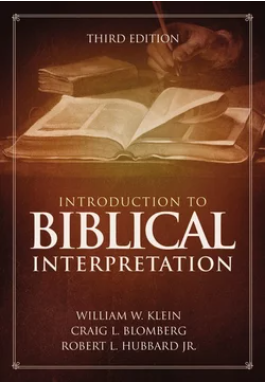Biblical Hermeneutics was my first academic course that focused on the science and art of interpreting the Scriptures. This program initially had an impact similar to a cultural shock and shook my foundational understanding of what it means to read the Bible. I began my journey with an apprehensive mindset that stemmed from my distrust of modern academia, based on my experience in the engineering world, and my fear of honoring analytical thinking at the cost of my relatively new relationship with Jesus, a God I hardly know. What happened next was an eight-week pilgrimage through a foreign landscape of spiritual formation. This blog post synthesizes the experience and the fruits it has produced.
Background
As with most things in my life that are related to God, this journey started with a dream where, in brief, I was told to rebuild a dilapidated church. Through a series of seemingly random events and a fire in my heart, I found myself at a University pursuing a master’s in divinity shortly after. My VA benefits required me to attend full-time, and because of the timing of my acceptance, I had to take three classes during one session with a fourth overlapping for the first two weeks of the second session.
I knew I was biting off more than I could chew, so I prayed daily for God to help me. Overwhelmed during my first week, I attempted to get ahead in my assignments in case I got sick later during the session. Little did I know that going into this course and reading its textbooks without guidance was a recipe for confusion.
Luckily, my professor locked all of the assignments and offered to meet with me via Zoom, especially after I had read a couple of chapters of my textbook. Before my Zoom meeting, I prayed and intended to be as honest as possible because I believe innocence in any relationship is a winning and Christlike strategy. During the meeting, something familiar happened; I felt the presence of the Spirit of God with me, and I also felt this same strong presence with the professor; then God spoke in my heart and said, “Trust her.” My relationship with God has always been that of trusting now and understanding later, so I put my fears and concerns away and obeyed.
The First Report
The first exegetical report looked like a foreign creature, as I had no idea how to approach it even after the related lecture. Again, I prayed, trusted, and went in with a mindset that said, “It does not have to be great; it just needs to be done!” After 14 hours, it was finished, and thinking about it now, my approach to research, writing, and formatting must have looked like a baby horse attempting to walk for the first time.
Despite the struggle, I could feel my brain rewiring into something new that, if I wanted to put into words, would have said, “This is the dawn of the age of reading the Bible respectfully.” I was excited because Paul, someone I saw as a random Biblical character, came to life. I could imagine the streets and marketplaces where he walked as I studied the passage within the context of the surrounding text.
Locution, perlocution, and illocution, words that made me giggle the first time I read them, were now part of my tool belt. Jeannine K. Brown, Charles B. Cousar, and Joseph H. Hellerman, previously faceless authors, have become the friends I bring with me on my Biblical expeditions. Though my experience was humbling, it also felt glorious. During the subsequent weeks, the workload from life responsibilities and three graduate courses began to take its toll. Still, I remained in continual prayer and measured my Biblical life one assignment at a time.
Subsequent Weeks
During subsequent weeks, I learned methods by which I could examine the historical-cultural background of Scripture and different genres of the Bible. My pastor called to ask me to do a sermon as he was scheduled for surgery. I had just finished my third report and decided to talk to my congregation about Psalm 1 and practice the famous Hermeneutical Spiral. As I prepared for my presentation, I noticed I was applying three elements I learned from my courses. Spiritual Formation class taught consideration and charity when talking to my community of Grace. The New Testament course led me to speak to my church in a language they can understand and to refrain from throwing a metaphorical thesaurus at them during my speech. Hermeneutics taught me how to study and read the Bible analytically and respectfully.
Love, humility, and Biblical fidelity were the three blessings and gifts God had granted me through my professors. A few days later, my pastor texted me that the congregation was happy with my presentation and asked if I could do another sermon. My journey had been brutal, but the fruits spoke for themselves.
The Final Report
During week seven, I got sick with fevers and dizziness, perhaps because I was not correctly tending to my immune system because of lack of sleep, but it was the week of my final report, and failure was not an option. At this point, I developed great respect and care for my professor, and the thought of hurting her feelings and disappointing her was out of the question. I took every vitamin, drank plenty of water, and began working on my report while arming myself with every bit of feedback I had received in my courses to improve my work. As if I did not care enough, the assignment was to construct Biblical theology within the context of the identity of Jesus.
Toward the end of week seven, I walked up to my wife and said, “Nobody should be allowed to learn this much in a week.” I was spent, but I came out on the other side with a Biblically sound answer to the question: Who is Jesus? This and my professor’s kind words of encouragement on the assignment were worth every bit of pain and effort.
So Why Do We Need Hermeneutics?
Hermeneutics helped me develop a newfound respect and admiration for Scripture. I was skeptical of academic Biblical interpretation, but because of this journey, I always strive to treat this incredible book inspired by God with the regard my professor taught me to have. I am grateful to the Holy Spirit for instructing me to trust and helping me with every assignment, as these fruits and gifts I have today result from the gift of obedience to God. Thank you, Jesus, for your work through my excellent professors. May God bless them and keep them.
Recommended Academic Book
Overview
Introduction to Biblical Interpretation, now in its third edition, is a bestselling hermeneutics textbook that sets forth concise, logical, and practical guidelines for discovering the truth in God’s Word. With updates and revisions throughout that keep pace with current scholarship, this book offers students the best and most up-to-date information needed to interpret Scripture.
Used in college and seminary classrooms worldwide, this textbook is a trusted and valuable tool for students and other readers who desire to understand and apply the Bible.







